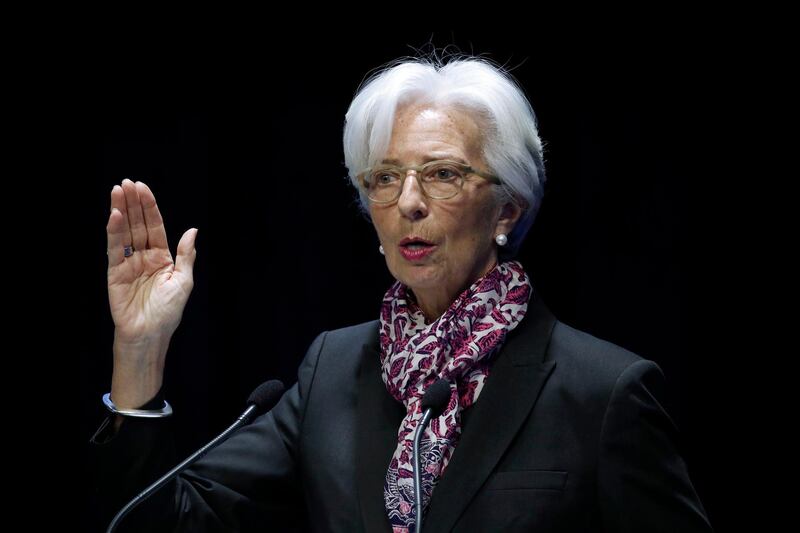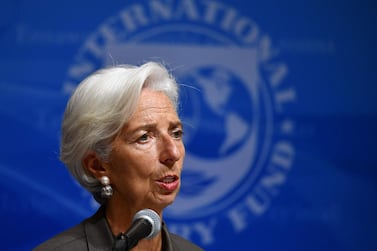The global economy is at a “delicate moment” amid rising trade tensions, high levels of debt and uncertainty over Brexit, the managing director of the International Monetary fund said on Tuesday.
“Only two years ago, 75 per cent of the global economy experienced an upswing,” Christine Lagarde said. “For this year, we expect 70 per cent of the global economy to experience a slowdown in growth.”
However, the IMF chief does not expect a recession to take place in the near term as some policies, such the US Fed patience with interest rates increases and more stimulus in China, help temper a slowdown. These policies will lead to an uptick in growth in the second half of this year and into 2020, she said.
The IMF lowered its global growth forecast for 2019 and 2020 in January, and warned of the dangers from escalating trade tensions that have already started to dampen the world economic outlook.
The global economy is set to expand 3.5 per cent in 2019 and 3.6 per cent the year after, 0.2 and 0.1 percentage points lower than the fund's October forecasts. Growth for 2018 was projected at 3.7 per cent.
The IMF, which will hold its spring meetings next week, will release an update of its global growth forecast that shows the world’s economy had “lost further momentum”, she said.
“The expected rebound in global growth later this year is precarious,” said Ms Lagarde. “It is vulnerable to downside risks - including country-related uncertainties, such as Brexit, and broader uncertainties such as high debt in some sectors and countries, tensions around trade policy, and a sense of unease in financial markets.”
The world economy is slowing down as a trade rift between the United States and China, the world’s two largest economies, intensifies. Last year, the US slapped 10 per cent tariffs on $200 billion worth of Chinese goods. Washington and Beijing are currently in talks to resolve their trade war.
Ms Lagarde proposed three types of action to help ensure a soft-landing for the global slowdown.
First, countries must undertake domestic polices that include structural reforms to boost productivity and long-term growth.
Ms Lagarde also pointed to the growing power of a few corporate giants and advocated for reining their influence on the domestic economies of countries.
“New IMF analysis shows that, over the past two decades, rising corporate market power in advanced economies had only a very small effect on investment, output and the share of national income paid to workers,” she said.
“But we also found that a small number of highly dynamic companies accounted for the highest price mark-ups.”
The European Union, for example, has penalised companies deemed to challenge competition.
In March, the EU fined Google €1.49 billion (Dh6.12bn), the economic bloc’s third antitrust fine slapped on the technology giant, for stifling competition in the online advertisement sector.
With regards to the second course of action related to cross-border polices, Ms Lagarde warned of the danger of trade barriers and their knock-on effect on growth.
“We have looked at what might happen if tariffs on all goods traded between the US and China went up by 25 percentage points. That alone would reduce annual GDP by up to 0.6 per cent in the US and by up to 1.5 per cent in China,” she said.
“These are potentially self-inflicted wounds that should be avoided.”
Ms Lagarde also warned of the dangers of tax evasion. Non-OECD countries lose some $200bn a year due to companies moving profit to low-income jurisdictions. This lost income makes it harder for low-income countries to boost growth and employment.
With regards to the third policy addressing global challenges, Ms Lagarde pointed to the economic cost of climate change and corruption.
Global energy subsidies, which amount to $5.2 trillion per year or 6.5 per cent of global GDP, are impacting climate change and need to be reduced.
Meanwhile, the annual cost of bribery is over $1.5tn, equivalent to 2 per cent of GDP, necessitating a stepping up efforts to resolve issues such as money laundering and the financing of terrorism.







